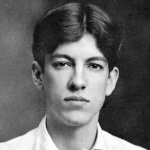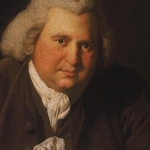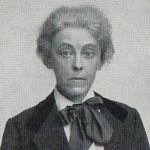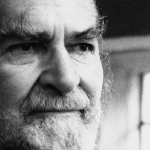Hymn to Life by James Schuyler

The wind rests its cheek upon the ground and feels the cool damp
And lifts its head with twigs and small dead blades of grass
Pressed into it as you might at the beach rise up and brush away
The sand. The day is cool and says, “I’m just staying overnight.”
The world is filled with music, and in between the music, silence
And varying the silence all sorts of sounds, natural and man made:
There goes a plane, some cars, geese that honk and, not here, but
Not so far away, a scream so rending that to hear it is to be
Read Poem And lifts its head with twigs and small dead blades of grass
Pressed into it as you might at the beach rise up and brush away
The sand. The day is cool and says, “I’m just staying overnight.”
The world is filled with music, and in between the music, silence
And varying the silence all sorts of sounds, natural and man made:
There goes a plane, some cars, geese that honk and, not here, but
Not so far away, a scream so rending that to hear it is to be
0
Itylus by Algernon Charles Swinburne

Swallow, my sister, O sister swallow,
How can thine heart be full of the spring?
A thousand summers are over and dead.
What hast thou found in the spring to follow?
What hast thou found in thine heart to sing?
What wilt thou do when the summer is shed?
O swallow, sister, O fair swift swallow,
Why wilt thou fly after spring to the south,
The soft south whither thine heart is set?
Shall not the grief of the old time follow?
Shall not the song thereof cleave to thy mouth?
Hast thou forgotten ere I forget?
Sister, my sister, O fleet sweet swallow,
Read Poem How can thine heart be full of the spring?
A thousand summers are over and dead.
What hast thou found in the spring to follow?
What hast thou found in thine heart to sing?
What wilt thou do when the summer is shed?
O swallow, sister, O fair swift swallow,
Why wilt thou fly after spring to the south,
The soft south whither thine heart is set?
Shall not the grief of the old time follow?
Shall not the song thereof cleave to thy mouth?
Hast thou forgotten ere I forget?
Sister, my sister, O fleet sweet swallow,
0
When Lilacs Last in the Dooryard Bloom’d by Walt Whitman

1
When lilacs last in the dooryard bloom’d,
And the great star early droop’d in the western sky in the night,
I mourn’d, and yet shall mourn with ever-returning spring.
Ever-returning spring, trinity sure to me you bring,
Lilac blooming perennial and drooping star in the west,
And thought of him I love.
2
O powerful western fallen star!
O shades of night—O moody, tearful night!
O great star disappear’d—O the black murk that hides the star!
O cruel hands that hold me powerless—O helpless soul of me!
O harsh surrounding cloud that will not free my soul.
Read Poem When lilacs last in the dooryard bloom’d,
And the great star early droop’d in the western sky in the night,
I mourn’d, and yet shall mourn with ever-returning spring.
Ever-returning spring, trinity sure to me you bring,
Lilac blooming perennial and drooping star in the west,
And thought of him I love.
2
O powerful western fallen star!
O shades of night—O moody, tearful night!
O great star disappear’d—O the black murk that hides the star!
O cruel hands that hold me powerless—O helpless soul of me!
O harsh surrounding cloud that will not free my soul.
0
The Comedian as the Letter C by Wallace Stevens

i
The World without Imagination
Nota: man is the intelligence of his soil,
The sovereign ghost. As such, the Socrates
Of snails, musician of pears, principium
And lex. Sed quaeritur: is this same wig
Of things, this nincompated pedagogue,
Read Poem The World without Imagination
Nota: man is the intelligence of his soil,
The sovereign ghost. As such, the Socrates
Of snails, musician of pears, principium
And lex. Sed quaeritur: is this same wig
Of things, this nincompated pedagogue,
0
Venus and Adonis by William Shakespeare

Even as the sun with purple-colour’d face
Had ta’en his last leave of the weeping morn,
Rose-cheek’d Adonis tried him to the chase;
Hunting he lov’d, but love he laugh’d to scorn;
Sick-thoughted Venus makes amain unto him,
And like a bold-fac’d suitor ‘gins to woo him.
‘Thrice fairer than myself,’ thus she began,
Read Poem Had ta’en his last leave of the weeping morn,
Rose-cheek’d Adonis tried him to the chase;
Hunting he lov’d, but love he laugh’d to scorn;
Sick-thoughted Venus makes amain unto him,
And like a bold-fac’d suitor ‘gins to woo him.
‘Thrice fairer than myself,’ thus she began,
0
Meeting at an Airport by Taha Muhammad Ali

You asked me once,
on our way back
from the midmorning
trip to the spring:
“What do you hate,
and who do you love?”
And I answered,
from behind the eyelashes
Read Poem on our way back
from the midmorning
trip to the spring:
“What do you hate,
and who do you love?”
And I answered,
from behind the eyelashes
0
Locksley Hall by Alfred, Lord Tennyson

Comrades, leave me here a little, while as yet 't is early morn:
Leave me here, and when you want me, sound upon the bugle-horn.
'T is the place, and all around it, as of old, the curlews call,
Dreary gleams about the moorland flying over Locksley Hall;
Locksley Hall, that in the distance overlooks the sandy tracts,
And the hollow ocean-ridges roaring into cataracts.
Many a night from yonder ivied casement, ere I went to rest,
Did I look on great Orion sloping slowly to the West.
Read Poem Leave me here, and when you want me, sound upon the bugle-horn.
'T is the place, and all around it, as of old, the curlews call,
Dreary gleams about the moorland flying over Locksley Hall;
Locksley Hall, that in the distance overlooks the sandy tracts,
And the hollow ocean-ridges roaring into cataracts.
Many a night from yonder ivied casement, ere I went to rest,
Did I look on great Orion sloping slowly to the West.
0
Purple Anemones by D. H. Lawrence

Who gave us flowers?
Heaven? The white God?
Nonsense!
Up out of hell,
From Hades;
Infernal Dis!
Jesus the god of flowers—?
Not he.
Read Poem Heaven? The white God?
Nonsense!
Up out of hell,
From Hades;
Infernal Dis!
Jesus the god of flowers—?
Not he.
0
I Have a Rendezvous with Death by Alan Seeger

I have a rendezvous with Death
At some disputed barricade,
When Spring comes back with rustling shade
And apple-blossoms fill the air—
I have a rendezvous with Death
When Spring brings back blue days and fair.
It may be he shall take my hand
And lead me into his dark land
And close my eyes and quench my breath—
It may be I shall pass him still.
I have a rendezvous with Death
On some scarred slope of battered hill,
When Spring comes round again this year
0
Paradise Lost: Book 5 (1674 version) by John Milton

NOw Morn her rosie steps in th' Eastern Clime
Advancing, sow'd the earth with Orient Pearle,
When Adam wak't, so customd, for his sleep
Was Aerie light from pure digestion bred,
And temperat vapors bland, which th' only sound
Of leaves and fuming rills, Aurora's fan,
Lightly dispers'd, and the shrill Matin Song
Of Birds on every bough; so much the more
His wonder was to find unwak'nd Eve
With Tresses discompos'd, and glowing Cheek,
As through unquiet rest: he on his side
Leaning half-rais'd, with looks of cordial Love
Hung over her enamour'd, and beheld
Beautie, which whether waking or asleep,
0
from The Botanic Garden, “The Economy of Vegetation”: Canto I by Erasmus Darwin

Argument
The Genius of the place invites the Goddess of Botany, 1. She descends, is received by Spring, and the Elements, 59. Addresses the Nymphs of Fire. Star-light Night seen in the Camera Obscura, 81. I. Love created the Universe. Chaos explodes. All the Stars revolve. God, 97. II. Shooting Stars. Lightning. Rainbow. Colours of the Morning and Evening Skies. Exterior Atmosphere of inflammable Air. Twilight. Fire-balls. Aurora Borealis. Planets. Comets. Fixed Stars. Sun’s Orb, 115. III. 1. Fires of the Earth’s Centre. Animal Incubation, 137. 2. Volcanic Mountains. Venus visits the Cyclops, 149. IV. Heat confined on the Earth by the Air. Phosphoric lights in the Evening. Bolognian Stone. Calcined Shells. Memnon’s Harp, 173. Ignis fatuus. Luminous Flowers. Glow-worm. Fire-fly. Luminous Sea-insects. Electric Eel. Eagle armed with Lightning, 189. V. 1. Discovery of Fire. Medusa, 209. 2. The chemical Properties of Fire. Phosphorus. Lady in Love, 223. 3. Gunpowder, 237. VI. Steam-engine applied to Pumps, Bellows, Water-engines, Corn-mills, Coining, Barges, Waggons, Flying-chariots, 253. Labours of Hercules. Abyla and Calpe, 297. VII. 1. Electric Machine. Hesperian Dragon. Electric Kiss. Halo round the heads of Saints. Electric Shock. Fairy-rings, 335. 2. Death of Professor Richman, 371. 3. Franklin draws Lightning from the Clouds. Cupid snatches the Thunderbolt from Jupiter, 383. VIII. Phosphoric Acid and Vital Heat produced in the Blood. The great Egg of Night, 399. IX. Western Wind unfettered. Naiad released. Frost assailed. Whale attacked, 421. X. Buds and Flowers expanded by Warmth, Electricity, and Light. Drawings with colourless sympathetic Inks; which appear when warmed by the Fire, 457. XI. Sirius. Jupiter and Semele. Nothern Constellations. Ice-Islands navigated into the Tropic Seas. Rainy Monsoons, 497. XII. Points erected to procure Rain. Elijah on Mount Carmel, 549. Departure of the Nymphs of Fire like Sparks from artificial Fireworks, 587.
“Stay your rude steps; whose throbbing breasts infold
The legion-fiends of Glory, or of Gold!
Stay! whose false lips seductive simpers part,
While Cunning nestles in the harlot-heart!—
For you no Dryads dress the roseate bower,
For you no Nymphs their sparkling vases pour;
Unmark’d by you, light Graces swim the green,
And hovering Cupids aim their shafts, unseen.
“But Thou! whose mind the well-attemper’d ray
Of Taste and Virtue lights with purer day;
Read Poem The Genius of the place invites the Goddess of Botany, 1. She descends, is received by Spring, and the Elements, 59. Addresses the Nymphs of Fire. Star-light Night seen in the Camera Obscura, 81. I. Love created the Universe. Chaos explodes. All the Stars revolve. God, 97. II. Shooting Stars. Lightning. Rainbow. Colours of the Morning and Evening Skies. Exterior Atmosphere of inflammable Air. Twilight. Fire-balls. Aurora Borealis. Planets. Comets. Fixed Stars. Sun’s Orb, 115. III. 1. Fires of the Earth’s Centre. Animal Incubation, 137. 2. Volcanic Mountains. Venus visits the Cyclops, 149. IV. Heat confined on the Earth by the Air. Phosphoric lights in the Evening. Bolognian Stone. Calcined Shells. Memnon’s Harp, 173. Ignis fatuus. Luminous Flowers. Glow-worm. Fire-fly. Luminous Sea-insects. Electric Eel. Eagle armed with Lightning, 189. V. 1. Discovery of Fire. Medusa, 209. 2. The chemical Properties of Fire. Phosphorus. Lady in Love, 223. 3. Gunpowder, 237. VI. Steam-engine applied to Pumps, Bellows, Water-engines, Corn-mills, Coining, Barges, Waggons, Flying-chariots, 253. Labours of Hercules. Abyla and Calpe, 297. VII. 1. Electric Machine. Hesperian Dragon. Electric Kiss. Halo round the heads of Saints. Electric Shock. Fairy-rings, 335. 2. Death of Professor Richman, 371. 3. Franklin draws Lightning from the Clouds. Cupid snatches the Thunderbolt from Jupiter, 383. VIII. Phosphoric Acid and Vital Heat produced in the Blood. The great Egg of Night, 399. IX. Western Wind unfettered. Naiad released. Frost assailed. Whale attacked, 421. X. Buds and Flowers expanded by Warmth, Electricity, and Light. Drawings with colourless sympathetic Inks; which appear when warmed by the Fire, 457. XI. Sirius. Jupiter and Semele. Nothern Constellations. Ice-Islands navigated into the Tropic Seas. Rainy Monsoons, 497. XII. Points erected to procure Rain. Elijah on Mount Carmel, 549. Departure of the Nymphs of Fire like Sparks from artificial Fireworks, 587.
“Stay your rude steps; whose throbbing breasts infold
The legion-fiends of Glory, or of Gold!
Stay! whose false lips seductive simpers part,
While Cunning nestles in the harlot-heart!—
For you no Dryads dress the roseate bower,
For you no Nymphs their sparkling vases pour;
Unmark’d by you, light Graces swim the green,
And hovering Cupids aim their shafts, unseen.
“But Thou! whose mind the well-attemper’d ray
Of Taste and Virtue lights with purer day;
0
The Waste Land by T. S. Eliot

‘Nam Sibyllam quidem Cumis ego ipse oculis meis vidi in ampulla pendere, et cum illi pueri dicerent:Σίβυλλα τίθέλεις; respondebat illa:άποθανεîνθέλω.’ For Ezra Pound
il miglior fabbro. I. The Burial of the Dead
Read Poem il miglior fabbro. I. The Burial of the Dead
0
The Trees are Down by Charlotte Mew

—and he cried with a loud voice:
Hurt not the earth, neither the sea, nor the trees—
(Revelation) They are cutting down the great plane-trees at the end of the gardens.
Read Poem Hurt not the earth, neither the sea, nor the trees—
(Revelation) They are cutting down the great plane-trees at the end of the gardens.
0
from Briggflatts: An Autobiography by Basil Bunting

I
Brag, sweet tenor bull,
descant on Rawthey’s madrigal,
each pebble its part
for the fells’ late spring.
Dance tiptoe, bull,
black against may.
Ridiculous and lovely
Read Poem Brag, sweet tenor bull,
descant on Rawthey’s madrigal,
each pebble its part
for the fells’ late spring.
Dance tiptoe, bull,
black against may.
Ridiculous and lovely
0
Love's Growth by John Donne

I scarce believe my love to be so pure
As I had thought it was,
Because it doth endure
Vicissitude, and season, as the grass;
Methinks I lied all winter, when I swore
My love was infinite, if spring make’ it more.
But if medicine, love, which cures all sorrow
With more, not only be no quintessence,
But mixed of all stuffs paining soul or sense,
And of the sun his working vigor borrow,
Love’s not so pure, and abstract, as they use
To say, which have no mistress but their muse,
But as all else, being elemented too,
Love sometimes would contemplate, sometimes do.
Read Poem As I had thought it was,
Because it doth endure
Vicissitude, and season, as the grass;
Methinks I lied all winter, when I swore
My love was infinite, if spring make’ it more.
But if medicine, love, which cures all sorrow
With more, not only be no quintessence,
But mixed of all stuffs paining soul or sense,
And of the sun his working vigor borrow,
Love’s not so pure, and abstract, as they use
To say, which have no mistress but their muse,
But as all else, being elemented too,
Love sometimes would contemplate, sometimes do.
0
Song: “It was a lover and his lass” by William Shakespeare

(fromAs You Like It) It was a lover and his lass,
With a hey, and a ho, and a hey nonino,
That o’er the green cornfield did pass,
In springtime, the only pretty ring time,
Read Poem With a hey, and a ho, and a hey nonino,
That o’er the green cornfield did pass,
In springtime, the only pretty ring time,
0
Spring, the sweet spring by Thomas Nashe

Spring, the sweet spring, is the year’s pleasant king,
Then blooms each thing, then maids dance in a ring,
Cold doth not sting, the pretty birds do sing:
Cuckoo, jug-jug, pu-we, to-witta-woo!
The palm and may make country houses gay,
Lambs frisk and play, the shepherds pipe all day,
And we hear aye birds tune this merry lay:
Cuckoo, jug-jug, pu-we, to-witta-woo!
The fields breathe sweet, the daisies kiss our feet,
Young lovers meet, old wives a-sunning sit,
In every street these tunes our ears do greet:
Cuckoo, jug-jug, pu-we, to witta-woo!
Spring, the sweet spring!
Read Poem Then blooms each thing, then maids dance in a ring,
Cold doth not sting, the pretty birds do sing:
Cuckoo, jug-jug, pu-we, to-witta-woo!
The palm and may make country houses gay,
Lambs frisk and play, the shepherds pipe all day,
And we hear aye birds tune this merry lay:
Cuckoo, jug-jug, pu-we, to-witta-woo!
The fields breathe sweet, the daisies kiss our feet,
Young lovers meet, old wives a-sunning sit,
In every street these tunes our ears do greet:
Cuckoo, jug-jug, pu-we, to witta-woo!
Spring, the sweet spring!
0
The Fête by Charlotte Mew

To-night again the moon’s white mat
Stretches across the dormitory floor
While outside, like an evil cat
The pion prowls down the dark corridor,
Planning, I know, to pounce on me, in spite
For getting leave to sleep in town last night.
But it was none of us who made that noise,
Only the old brown owl that hoots and flies
Read Poem Stretches across the dormitory floor
While outside, like an evil cat
The pion prowls down the dark corridor,
Planning, I know, to pounce on me, in spite
For getting leave to sleep in town last night.
But it was none of us who made that noise,
Only the old brown owl that hoots and flies
0
Variations Done for Gerald Van De Wiele by Charles Olson

I. Le Bonheur
dogwood flakes
what is green
the petals
from the apple
blow on the road
mourning doves
mark the sway
Read Poem dogwood flakes
what is green
the petals
from the apple
blow on the road
mourning doves
mark the sway
0
from The Seasons: Winter by James Thomson

See, Winter comes to rule the varied year,
Sullen and sad, with all his rising train—
Vapours, and clouds, and storms. Be these my theme,
These, that exalt the soul to solemn thought
And heavenly musing. Welcome, kindred glooms!
Congenial horrors, hail! With frequent foot,
Pleas’d have I, in my cheerful morn of life,
When nurs’d by careless solitude I liv’d
And sung of Nature with unceasing joy,
Pleas’d have I wander’d through your rough domain;
Trod the pure virgin-snows, myself as pure;
Heard the winds roar, and the big torrent burst;
Or seen the deep-fermenting tempest brew’d
In the grim evening-sky. Thus pass’d the time,
Till through the lucid chambers of the south
Read Poem Sullen and sad, with all his rising train—
Vapours, and clouds, and storms. Be these my theme,
These, that exalt the soul to solemn thought
And heavenly musing. Welcome, kindred glooms!
Congenial horrors, hail! With frequent foot,
Pleas’d have I, in my cheerful morn of life,
When nurs’d by careless solitude I liv’d
And sung of Nature with unceasing joy,
Pleas’d have I wander’d through your rough domain;
Trod the pure virgin-snows, myself as pure;
Heard the winds roar, and the big torrent burst;
Or seen the deep-fermenting tempest brew’d
In the grim evening-sky. Thus pass’d the time,
Till through the lucid chambers of the south
0